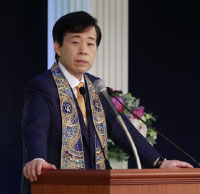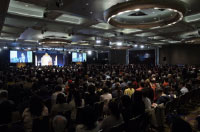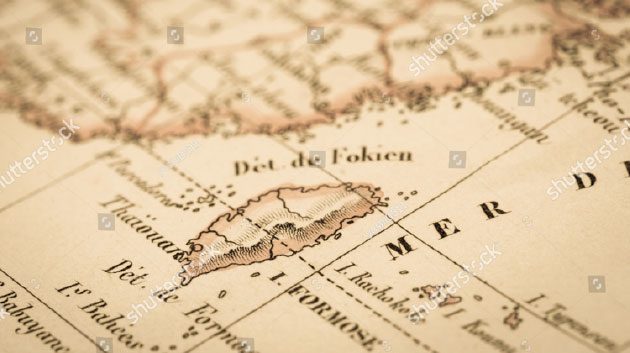Spreading Taiwan’s “Freedom, Democracy and Faith” to Mainland China
Master Okawa's Lecture in Taiwan

Master Okawa gives a lecture in Taiwan for the first time in 11 years.

The audience listens attentively at the Grand Hyatt Taipei.
Master Ryuho Okawa, founder and CEO of Happy Science, gave a lecture in Taiwan on 3rd March to help save them from the crisis of a potential Chinese invasion. The landmark lecture pointed out the paths that Taiwan, China and Japan must now travel.
The war of words between Taiwan and China has suddenly risen sharply.
On 2nd March, Taiwanese President Tsai Ing-wen told Sankei Shinbun that, “Taiwan and Japan face the same threat [China’s military] in East Asia,” so “there is a great need to step up the level of security talks.”
This was the first time that Tsai so boldly requested direct talks with a country that has no diplomatic ties with Taiwan. On the 11th, she convened a state security conference and stated, “Whether China can walk down the road towards democratization becomes the key to protecting peace and progress on both sides of the Taiwan Strait.”
The Chief of the Armed Forces was present for the first time at such an occasion since Tsai’s inauguration in 2016. The President is making clear her wariness against China.
Tsai has relinquished her character of a careful scholar, and has started to make bold statements to proactively contain China.
China Threatens and Divides Taiwan
But China isn’t just going to just sit there and watch.
On 13th March, The Chinese People’s Political Consultation Conference, the government’s advisory board, under Xi Jinping’s supervision, passed a resolution to “Strictly oppose the plans and actions of Taiwan independence and separation from the Mainland.”
They are also scheming a divide within Taiwan’s government. The National People’s Congress, which convened alongside the Consultation Conference, legislated a policy to please Taiwanese businesses and students in China through various benefits. This could work to separate the people from the Taiwanese government, and thereby prevent Tsai’s re-election in January 2020.
In January this year, Xi Jinping threatened Tsai and Trump that he is “willing to consider military action against outside influences and powers that support Taiwan’s independence.” Annexing Taiwan before the 100th anniversary of the Communist Party in 2021 is crucial to securing his absolute dictatorship.
“Taiwan Is a Different Country”
Amidst the fierce clashes between Taiwan and China, Master Ryuho Okawa of Happy Science visited the Taiwanese capital of Taipei on 3rd March to give a lecture entitled, “Love Surpasses Hatred”.
Master Okawa decided on this lecture in Taiwan after receiving a letter from former Taiwanese President Lee Teng-hui in February. In the letter, the former President said he wants to entrust the future of Taiwan to Master Okawa.
Master Okawa appeared in front of 800 people including high-profile businessmen and media personnel, and spoke to the people of a country that the international community has chosen to ignore.
“There is no need to seek independence [from China]. Taiwan is already developing as a unique country. This country is different from China.”
Taiwan fulfills the three factors that constitute a country: territory, citizens and sovereignty. Looked at this way, Taiwan is indeed an independent country. In 1996 they held their first Presidential election and officially embraced democratization. Ruling parties in the administration have changed numerous times since.
China emphasizes that they are the same race as the Taiwanese people, and that therefore Taiwan is part of China. But Taiwan already has territory, citizens and sovereign power that hardly resembles China. Taiwan has been fulfilling their role as a sovereign nation that protects the freedom and rights of the people.
Master Okawa’s words gave courage to the listeners, despite the fact that even the Vatican – the highest authority of the Catholic Church – has abandoned Taiwan for China.
Back in 2006, one of Japan’s most prominent international law specialists said, “Regardless of the fact that the Republic of China was dismissed from the UN, under international law, they remained a proper country that owns the territory we call Taiwan . . . Taiwan had land, citizens and a fully established Kuomintang government.”
“Threats and pressures coming from the People’s Republic of China across the Taiwan Strait is an invasion of the rights belonging to the people of Taiwan,” he added.
“The Republic of China Had Their Territory Taken”
Twenty-five years ago in 1994, Master Okawa had said in a lecture that, “Taiwan has never been ruled by a communist government.” In the Q&A session after his recent Taiwan lecture he elaborated on this thought.
“Historically, it would be correct to say that the Republic of China had their territory taken by the People’s Republic of China . . . The Republic of China had their land taken. That is why the People’s Republic shouldn’t be demanding, ‘give us back what is ours,’ because it was never theirs.”
In 1943, the leaders who made the triumvirate in the Cairo Declaration to decide post-war strategies were U.S. President Franklin Roosevelt, British Prime Minister Winston Churchill and none other than the President of the Republic of China, Chiang Kai-shek.
In the Charter of the United Nations that the Allied powers enacted to serve as the Constitution of the UN, Article 23 states, “The Security Council shall consist of fifteen Members of the United Nations,” and goes on to name “The Republic of China” first on the list. The country clearly has a historical significance.
In 1949 Mao Zedong, who defeated Chiang Kai-shek in the civil war and drove him out to Taiwan, founded the People’s Republic of China. Then he invaded Tibet and the Uighur lands, watched as millions starved to death and poured huge sums of money into developing nuclear weapons, and sent large support, funds, and supplies to Africa.
This all came to fruition in 1971. The UN decided to give Beijing (The People’s Republic) and not Taiwan (The Republic of China) the right to represent China. Beijing became a permanent member of the UN Security Council, and Taiwan left.
One-party dictatorships are willing to use any means in the name of expansionism. They go around like mafia using money, weapons, violence and fear to take control over their own people and other neighboring countries. The One Belt, One Road is the most recent incarnation.
The international community must not forgive their atrocities.
Main points in Master Okawa’s lecture:
- Taiwan doesn’t need to seek independence: they already are.
- China has never ruled over Taiwan.
- Taiwan’s territory is being targeted by China.
- As a country known for Bushido, Japan should be ashamed of having cut ties with Taiwan.
- There is a need to spread Taiwan’s values of freedom, democracy and faith into China.
“Japan Will Not Abandon Taiwan”
China’s pressures on Taiwan will continue to escalate until 2021. “But don’t worry,” said Master Okawa. “This time the people of Japan will not abandon Taiwan.” He went on to explain how Japan was changing, and moving towards establishing a cooperative defense system with the U.S. in preparation for China’s invasions in the Taiwan Strait, South and East China Sea areas.
“Japan is gathering power to deter China and prevent them from attacking U.S. aircraft carriers. In this sense you don’t have to worry about military matters,” he added.
China is trying to deploy nuclear powered submarines equipped with nuclear missiles to patrol the South China Sea and create a system where they can threaten to attack the U.S. at any time.
They have also developed the anti-ship ballistic missile (ASBM), otherwise known as the “aircraft carrier killer”. They are attempting to establish domination over Asia by keeping the U.S. at arms-length.
If China invades Taiwan they would gain control over the sea-lanes in the South China Sea, and therefore the power to block 80% of Japan’s petroleum imports from arriving safely. If they gain this power, Japan would have no choice but to obey them.
Japan’s next defense strategy should be: 1) Enact a new law to boost the right of collective defense to match the global standard; 2) Strengthen defense of the Nansei Islands while establishing a secure network with South East Asia and the U.S., and creating a routine of patrolling the oceans; 3) Stimulate the defense industry and proactively relocate defense equipment to various countries in the Pacific.
There is also a need to make major diplomatic adjustments: 1) Establish a Taiwan Relations Act similar to the U.S. and provide defense equipment while creating de facto diplomatic ties with Taiwan; 2) Acknowledge that Taiwan is a separate country from China, and aim for the normalization of diplomatic relations; 3) Endorse Taiwan’s return to the UN Security Council.
Spreading Taiwan’s Prosperity to the Mainland
The ultimate goal is the collapse of the dictatorial communist regime and the democratization of China. Master Okawa also had a message for the people in Mainland China:
My wish is to also consider the opinions of the people in Hong Kong, and to establish a political party in Mainland China based on the values upheld in Taiwan and Hong Kong. I want to make the People’s Republic of China a two-party system, at least. I want China to change to a parliamentary system where parties can compete with political policies.
Wu Renhua, a consultant of The Democracy Party of China, which has been the target of China’s oppression since the Tiananmen Square Incident, spoke to the Liberty Magazine.
“Our members in Mainland China have been arrested and tortured many times. There are members overseas – like myself – and I think there needs to be pressure from outside for China to successfully establish a two-party system,” he said. “All of China’s democracy activists feel the need for a political party that can oppose the Communist Party.”
“The Chinese Communist Party likes to conquer other countries through power,” says He Anquan of the Shanghai National Party, who recently defected to the U.S. “But we don’t want power; we want freedom.”
In his lecture, Master Okawa said, “Spreading Taiwan’s prosperity and progress; this democratic, liberalistic and capitalistic thinking; and the awareness of the importance of faith into Mainland China is what will lead to the happiness of the Chinese people.”
Japan must fulfill her role as Asia’s superpower and protect Taiwan alongside the U.S. Japan has a mission to spread the values of freedom, democracy and faith throughout Mainland China.



















